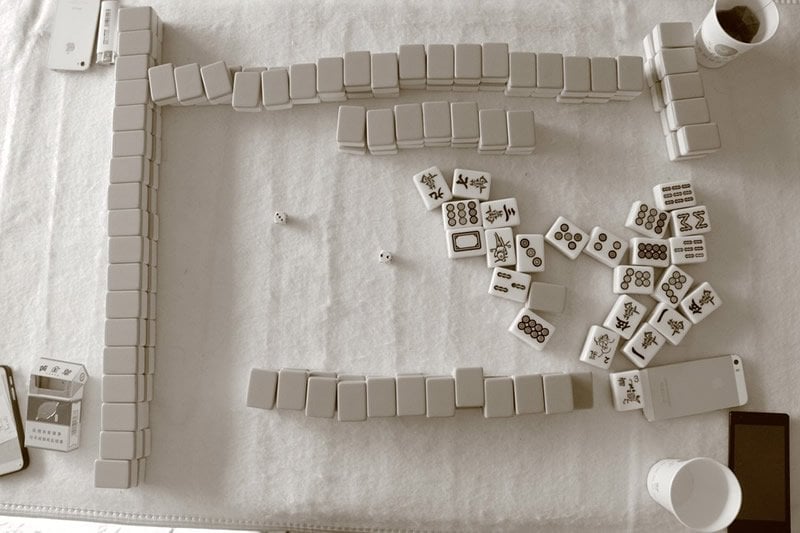Summary: Playing Mahjong and other games that require social participation can help to reduce symptoms of depression.
Source: University of Georgia
When it comes to boosting mental health among older Chinese, it might be as simple as a game of mahjong, according to a new study from the University of Georgia.
Regularly playing the popular tile-based strategy game was one of several types of social participation linked to reduced rates of depression among middle-aged and older adults in China in the study appearing in Social Science & Medicine.
“Global economic and epidemiologic trends have led to significant increases in the burden of mental health among older adults, especially in the low- and middle-income countries,” said Adam Chen, an associate professor of health policy and management at UGA’s College of Public Health and study co-author.
Poor mental health is a major issue in China, which accounts for 17% of the global disease burden of mental disorders. On top of that, mental health issues related to social isolation and loneliness are on the rise as China’s number of older adults – as in other nations – continues to increase.
The benefits of participating in social activities to mental health have been widely acknowledged, and some work has been done in developed nations, including the U.S. and Japan, to better understand this relationship.
But little is known about the role of social interaction and mental health outside of these settings.
“Social participation manifests itself in different formats within different cultural contexts,” said Chen.
“Our paper provides evidence on the association between social participation and mental health in the context of a developing country. We also examined the rural-urban difference, which has not been examined extensively in this line of literature.”
Chen and collaborators from China’s Huazhong University of Science and Technology analyzed survey data from nearly 11,000 residents aged 45 years and older from the nationally representative China Health and Retirement Longitudinal Study.
They looked at symptoms of depression and compared it to the type and frequency of social participation, including visiting with friends, playing mahjong, participating in a sport or social club, and volunteering in the community.
They found that, on the whole, participating in a wide variety of activities more frequently was associated with better mental health. Specifically, urban residents who played mahjong, a popular strategy game, were less likely to feel depressed.
That wasn’t too surprising for Chen, as this finding was in line with other studies, but he was surprised to find that rural Chinese overall tended to report poor mental health compared to their urban counterparts.
“Traditionally, rural China featured tight-knit communities of close kinship, often with a limited number of extended large families in a village,” he said. “We were expecting strong ties and communal bonds in rural China, but it appears that we were wrong.”
Chen suspects that the social structures in rural China were disrupted as many able-bodied adults moved into cities to find work. While family ties remained strong, community ties weakened in rural areas.

“What is more surprising is that mahjong playing does not associate with better mental health among rural elderly respondents,” added Chen. “One hypothesis is that mahjong playing tends to be more competitive and at times become a means of gambling in rural China.”
The authors believe these findings may offer a guide to health practitioners designing policies and interventions to improve mental health among older Chinese.
The findings could also translate, said Chen, to Asian American communities.
“Older Asian Americans have a much higher proportion of suicidal thoughts than whites and African Americans,” he said. “Improving social participation among older Asian Americans may help to address this burden to the U.S. population health that has not received due attention.”
Source:
University of Georgia
Media Contacts:
Lauren Baggett – University of Georgia
Image Source:
The image is in the public domain.
Original Research: Closed access
“Melancholy or mahjong? Diversity, frequency, type, and rural-urban divide of social participation and depression in middle- and old-aged Chinese: A fixed-effects analysis”. Adam Chen et al.
Social Science & Medicine doi:10.1016/j.socscimed.2019.112518.
Abstract
Melancholy or mahjong? Diversity, frequency, type, and rural-urban divide of social participation and depression in middle- and old-aged Chinese: A fixed-effects analysis
The potential benefit of social participation (SP) to one’s mental health has been widely acknowledged. Nevertheless, the specific type and amount of SP that is associated with improved depressive symptoms in middle- and old-aged Chinese awaits further investigation. This study aimed to understand the patterns of depression and SP by comparing urban vs rural China, and according to which, measure the associations between changes in SP and that in depressive symptoms. A total of 10,988 community residents aged 45 years and above were selected from wave 1 (2011), wave 2 (2013), and wave 4 (2015) of the China Health and Retirement Longitudinal Study (CHARLS), a nationally representative survey. The fixed-effects analysis was used to explore the association between the changes in diversity, frequency, and type of SP and the changes in depressive symptoms. The results indicated that rural respondents suffered from a significantly higher risk of depression and took less SP than their urban counterparts. Transitioning from no SP to 1 or more types of SP or to a once a week or higher frequency was associated with a decline in depressive symptoms. For urban respondents, playing mah-jong or cards and joining sports or social clubs predicted a decline in depressive symptoms. For rural residents, interacting with friends regularly was associated with fewer depressive symptoms. In conclusion, more diverse and higher frequency of SP was associated with better mental health, while the social significance of SP varied across different types of SP and between rural and urban areas.






